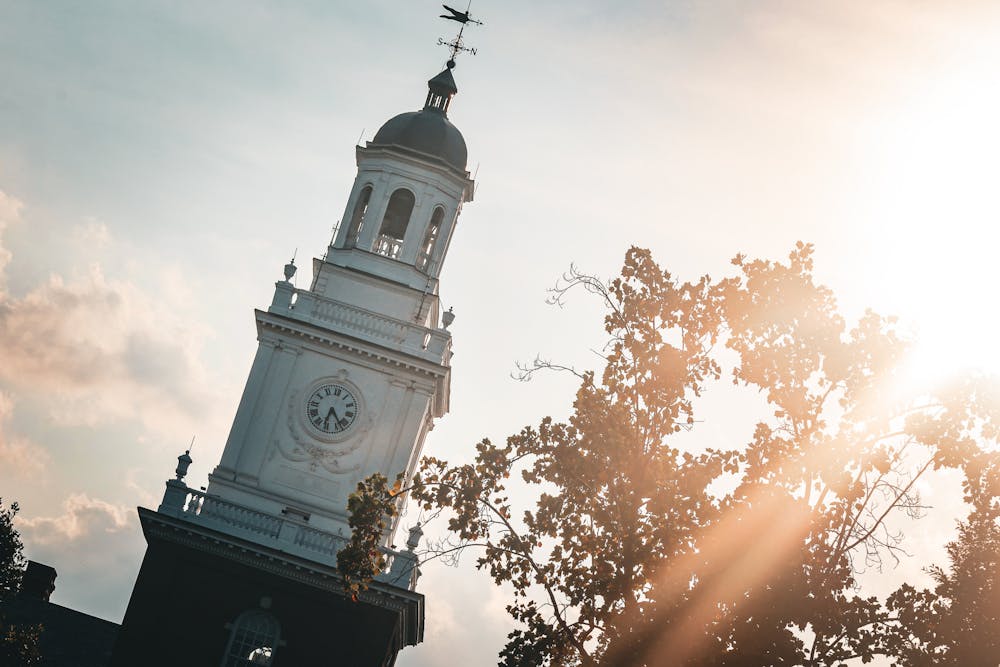President Ronald J. Daniels announced the new Johns Hopkins University School of Government and Policy (SGP) in a University-wide broadcast on Oct. 6. The school will be the first new academic division at Hopkins since 2007.
“The school will build upon the foundation of Johns Hopkins University’s nearly 150 years of leadership in research and discovery... to research and develop innovative, data-driven approaches to contemporary policy challenges and effective government,” Daniels wrote in the broadcast.
SGP will make its home at the recently opened Johns Hopkins University Bloomberg Center at 555 Pennsylvania Avenue in D.C. (the Hopkins Bloomberg Center), where the School of Advanced International Studies (SAIS) is also located. It will provide avenues for students and faculty to contribute to data-driven research, debate and analysis in public policy.
Daniels also expanded upon how the school could change the way students and faculty at the Homewood Campus engage in global politics.
“[The SGP] will also be part of a reciprocal connection between Baltimore and Washington that allows our Baltimore-based faculty and students to easily and effectively bring their ideas and expertise to Washington, while Washington’s policymakers and policy analysts more regularly engage with the vibrant communities of our flagship campuses in Baltimore,” he wrote.
Ideas for the SGP began to take hold as construction started on the Hopkins Bloomberg Center in 2019. Then, the need for rigorous academic focus on data-driven expertise and political action became apparent to the University in the wake of the COVID-19 pandemic.
By fall of 2026, SGP will offer master’s and doctorate degrees as well as opportunities for undergraduates. Specific details of its academic offerings remain undetermined until the University is able to find a dean for the school and begin hiring its first 35 full-time faculty members.
Meanwhile, the school will begin public event programming sometime in late 2024, with events for students, alumni and the general public taking place at the Hopkins Bloomberg Center.
Prospective International Studies major freshman Mai Dang voiced in an interview with The News-Letter that she was interested in the possible graduate programs and courses at SGP.
“When I heard of the name School of Government and Policy, I thought that it would be somewhere I could learn a lot of things that are useful for my future career,” she said.
While Dang expressed interest in graduate school at SGP, she was uncertain if the new school would fulfill her interests in international governments and policy.
In an email to The News-Letter, Vice Provost for Interdisciplinary Initiatives Lainie Rutkow wrote that the SGP will have a complementary and collaborative relationship with SAIS. The two schools will share a number of jointly-appointed faculty and joint research projects.
“Working with SAIS, the School of Government and Policy will be able to tackle transnational policy challenges holistically without reference to geographic borders or jurisdictional boundaries,” she wrote.
Junior Jacquelyn Slade echoed Dang’s sentiments in an interview with The News-Letter, sharing her excitement about the possibilities that SGP could bring to her future.
While SAIS is renowned for its graduate program in international relations, Slade said that a school focused on the U.S. government would align better with her goals.
“I want to run for office and be more involved in policy, whereas SAIS, I feel, is more internationally focused,” she said.
SGP is the latest venture in the University’s pursuit of civic engagement, an advancement in fulfilling the Ten for One’s strategic vision for government innovation. The announcement of the new school comes in conjunction with the University’s new Civic Life minor and upcoming Moral and Political Economy major, as well as the development of the new Hopkins Bloomberg Center and the Stavros Niarchos Foundation Agora Institute.
Other endeavours in this field include the 2015 launch of the Bloomberg Center for Government Excellence and the annual Democracy Day.
Rutkow views these government and policy ventures as one of the many ways students can engage in civics and democracy.
“We see this as an essential part of our obligation to cultivate in our students the knowledge, skills, values and aspiration to become active democratic citizens,” she wrote.
Slade shared similar ideas on civic involvement at Hopkins.
“I personally think civic engagement is very important. I have a personal stake in this since I am a campus student director at Hopkins Votes, and I believe everyone’s voice should matter,” she said. “I want that to be a value at the School of Government [and Policy].”





